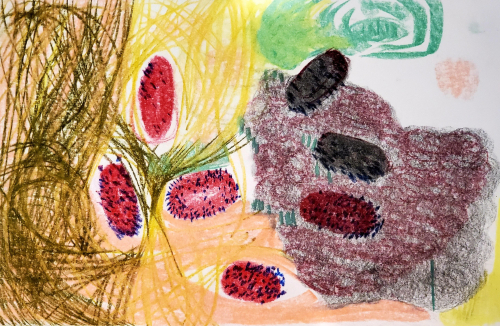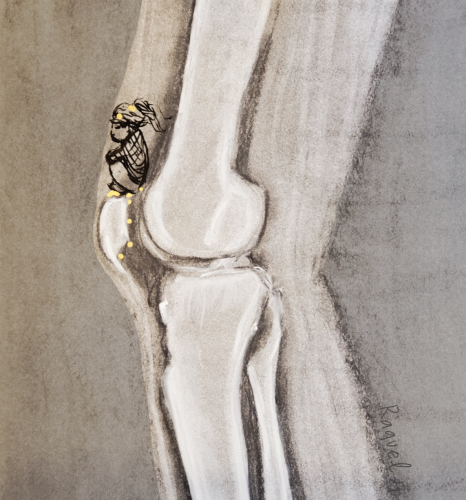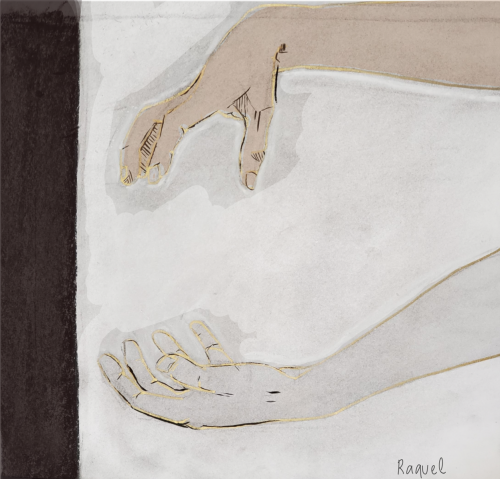ORDERING QUESADILLAS

"Bacilli social distancing"
Author: Dr. Raquel Lamarch, Med/Peds PGY-2, UNMC
Faculty Mentor: Dr. Allison Ashford, Med/Peds Program Director, UNMC
This piece was first featured on KevinMD!
"I didn't understand what you said," said the waitress."She very clearly said she wanted a quesadilla with a side of beans!" yelled an elderly gentleman at a different table.
With the same confidence of a fresh medical school graduate who knows something about medicine, I thought I spoke decent English until I moved to the US and repeatedly received "I do not understand you" looks and responses, often even before I said anything. I am from the island of merengue music, the Dominican Republic, and immigrated to the US for residency after finishing medical school at the Instituto Tecnologico de Santo Domingo. I am currently a second-year resident and the only Latina in my Med/Peds residency in Omaha.
The nervousness that arose when ordering food at restaurants grew as months passed like the fetus of a diabetic mother. My thoughts would race around what words to pick and how to pronounce them. My cheeks flushed as I stuttered sounds that came out different from what I’d envisioned.
Why did I feel ashamed to speak? People in my country would go above and beyond to understand white folks despite having been enslaved and robbed by them. Interestingly, the Dominican culture has typically been careless about understanding Haitians (who sadly represent our cheap undocumented labor) and their language, Creole. We, Dominicans, value whiteness more than ourselves; hence, we'd rather question our intelligence if we could not understand something. My grandmother was ashamed of her black skin. My mother was frightened by the idea of having grandchildren with “bad" afro-textured hair. When I dated a man of color for the first time (which I was proud to do, coming from a family who “coincidentally” only paired with white Europeans), can you believe he even bought a new car for my mother’s approval?!
"Why can't you be more conversational when you are presenting a medical case?" asked my senior. "Because when I try, I can't. I am expected to talk like you, but I just can’t,” I thought to myself. The frustrating part is that a male surgeon's thick Russian accent was described as "cool" by multiple seniors. Fascinating! The male surgeon was allowed to have an accent. So, I wonder, "Why are we fueling a privileged and power-oriented society here and in my country? Why is self-doubt easier than questioning why humans are unwilling to understand minorities? Why do we make it harder for those who have it hard?” For a second, I see myself like they see me, a virus halting the system’s efficiency and growth. "Can you help me not have an accent?" I asked my significant other. "Why do you want to change your accent?" he asked.
Discussing medical cases with attendings required even more brainpower than ordering quesadillas, to the point that little juice was left for medical decision making. I would reflect about the patient encounter in Spanish, then translate, and write down every detail to not miss anything. I've had evaluations simplifying my struggle to, "Raquel does not do well at applying medical knowledge to her patient's assessments." I felt like I was a child all over again: discovering the hallways of a fancy hospital and a new city, figuring out how to communicate in English and in the medical world, and learning how to use EMRs and proper documentation.
Everything was new, and I have been soaking it all in. This is meant to be exciting and fun, right?! The challenge of enjoying the adventure of something that feels foreign is the weight of expectations. I am expected to not be foreign, and to be at the level, in all areas, as my peers. This reality has nothing to do with my program's culture, which is fantastic, but has to do with the fact that it is laborious to evaluate what we don't understand.
Overcoming the guilt and stigma I felt for not being white has been a layered process that took about 2 years. It included taking time to feel at home by painting and practicing yoga, filling with pride every time I laughed at my Hispanic patient's jokes, and the support from other Latinos, my co-residents, and my program's faculty.
"There is nothing wrong with my accent."
"Yes, I may have more to learn. I will need help, and I deserve it."
"Giving with no boundaries is not going to truly convince anyone of my value."
"I am not voiceless, even if not many have the tools to understand this."
My program director never gets tired of reiterating, "you belong and fit here, and we are lucky to have you. Can you please believe me?" I had to repeat these mantras to myself until they felt real to me.
I knew I was healing when I started losing the fear of showing my "Latina fire" by standing up for myself and others. As I looked around, I understood I was surrounded by white males continuously celebrated as being right for breathing, who might have no notion of being wrong about someone as foreign as me. For the first time, I was OK with people using my views and sentiments as an excuse to think they know me, fulfilling their "Latina with an attitude" stereotype (even if anger has never been my default). At the end of the day, there is a delicate balance between taking the punches (acknowledging things aren't personal) and losing compassion towards yourself and, consequently, empathy towards others: your patients. Sometimes, you ought to stand up.
I promised myself, I will never question my worth when I am misunderstood. As I drove home to merengue music, I remembered quesadilla is a Spanish word.
Art & Medicine: I feel most myself when I am engaged in the process of creating something, in a flow state. My painting themes match my residency rotations. This helps me see my patients as something I have spent meaningful time with, and not as a group of diseases attached to a to-do list. Above, I pictured “Bacilli social distancing”. Here below are two more pieces.

“A girl processing the day; the wind of her thoughts doesn't seem to disturb her. She is sitting in the cold, knees are cold; yet, she feels comfortable and warm enough."

“A fair-skinned forearm in the bottom receiving energy from a, very tense, brown-skinned forearm.”




























































